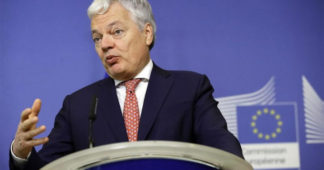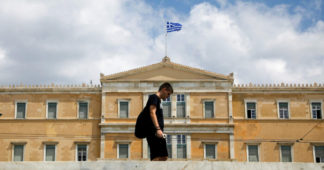The president of the LIBE Committee and Spanish MEPs have asked the EU to investigate recent revelations and have proposed making adherence to human rights law a condition for the allocation of EU funds to Greece.
Mar 23, 2023
Spanish MEPs, including the president of the European Parliament’s Committee on Civil Liberties, Justice and Home Affairs (LIBE) immediately reacted to the revelations made in a joint investigation by Solomon and Spanish newspaper El País regarding refugees being mistreated and robbed by Greek border guards in the Evros region, calling on the EU to further investigate the issue.
The report, first published on March 6 in El País in Spanish and a few days later by Solomon in Greek and English, states that in recent years Greek border guards have stolen more than €2 million from refugees they illegally deported.
The president of LIBE, Spanish social democrat Juan Fernando López Aguilar, and his colleagues Javier Moreno Sánchez and Domènec Ruiz Devesa, submitted a question, on March 8, to Ylva Johansson, Commissioner for Home Affairs; Vera Jurová, Vice-President for Values and Transparency; and to Margaritis Schinas, Vice-President and Commissioner for the Promotion of the European Way of Life.
In part, the question reads: “…will the Commission open a formal investigation to verify the alleged actions of the Greek security forces? Does the Commission consider the abovementioned practices in line with EU law?…”

On March 6, a LIBE delegation arrived in Athens as part of a planned visit to investigate “allegations related to the state of European values in Greece”.
In her report, Silvia Ayuso, El País correspondent in Brussels, underlined the intention of the LIBE delegation to add the issues raised by the Solomon & El País article, to the agenda “in its meetings with the Greek Prime Minister, Kyriakos Mitsotakis, and other Greek authorities, including the Asylum Service, local Frontex officials and NGOs”.
However, it turned out that LIBE delegation’s three-day stay in Athens, did not include meetings with the Prime Minister, government ministers and other officials, who invoked a period of national mourning following the tragic rail accident in Tempi on February 28, which left 57 people dead. The delegation instead met with independent Greek authorities (National Transparency Authority, Data Protection Authority, Communication Security and Privacy, Ombudsman, National Commission for Human Rights, Asylum Service), as well as representatives of civil society, journalists and Frontex.
A statement by Sophie in ‘t Veld, head of the delegation, made on behalf of the group at the end of the visit, noted: “The treatment of migrants at the external borders and domestically, including reports about systematic pushbacks, violence, arbitrary detention and theft of their belongings, is highly unsettling.”
Strasbourg’s plenary session
Speaking to El País, Juan Fernando López Aguilar said he will raise the issue of the theft of refugees’ belongings by border guards in the Evros region to Ylva Johansson during the European Parliament’s plenary session in Strasbourg this week. “There is a basis of empathy with the challenges the Greek administration and its security forces face in handling such a difficult situation [as the border with Turkey],” assured López Aguilar.
However, he added, the refugee situation in Greece is a “chronic problem” and under no circumstances will “any human rights violations” be tolerated. The Spanish MEP called the behavior of the border guards which is reported in refugee testimonies regarding the theft of their money and personal belongings “unacceptable”.
This is the second time that LIBE has submitted a question to the Commission in recent weeks, regarding migration management in Greece.
In February, a New York Times article revealed that the Frontex human rights chief called for the European agency’s withdrawal from Greece, due to repeated human rights abuses of asylum seekers by Greek border guards.
At the time, López Aguilar had addressed the Commission, asking if there was an intention to set as a condition the Greek state’s compliance with international and European law in order to continue European funding related to asylum and migration.
Question from three Spanish MEPs
Following the revelations of Solomon and El País, Spanish MEPs Ernest Urtasun (Greens-European Free Alliance), Sira Rego and María Eugenia Rodríguez Palop (European Left), submitted a question to the Commission asking if it intends to launch an investigation in order to “verify if these the events are happening in Greece” and to develop any measures, in Greece and at other external borders, to “monitor this violation of fundamental rights”.
The three MEPs also asked to be informed if the Commission “considers that the development of European funds in the border areas is compatible with the practice of taking money and valuables from immigrants”.
Stavros @Malichudis y @Andresmourenza desvelan hoy en @el_pais cómo las Fuerzas de Seguridad griegas ?? llevan años saqueando a las personas migrantes antes de devolverlas en caliente a Turquía ??https://t.co/GH2wGabxlx
— Sira Rego? (@sirarego) March 6, 2023
In a first official response, a representative of the European Executive Office limited himself to underlining that effective border management must be “based on respect for fundamental rights, including human dignity, and the principle of non-refoulement” and stressed that member states “must fulfill their obligations” regarding these provisions.
It is noted that on Monday, March 13, 2022, El País dedicated its main article to the revelations of the joint investigation with Solomon.
“It is true that Greece is one of the EU countries under the most pressure regarding irregular migration, they were at the forefront of the great migration crisis of 2015 – which put the whole of Europe to a serious test – and that it shares a border with neighboring Turkey, which uses migrant pressure as a political and economic bargaining chip against Brussels,” the Spanish newspaper reported.
“But we must not forget that Athens is receiving help from the EU in dealing with the situation – in 2020 alone the Commission committed €700 million to Greece exclusively for the borders – and above all that both the founding authorities of the EU and the Greek Constitution itself do not tolerate humiliating treatment or abuse of power, which is exactly what happens systematically.”
Ministry of Migration: Denies without further explanations
Before publishing our investigation, Solomon and El País submitted questions to the Greek authorities.
We cited a report by the UNHCR that recorded 311 pushbacks in the Evros region including 6,680 victims between January 2020 and December 2021, and asked if there are any ongoing judicial or police investigations.
We brought to the attention of the authorities the recorded cases of refugees who have already received asylum in Greece, who have testified that they were kidnapped hundreds of kilometers away from Evros (e.g. in Thessaloniki) and pushed back to the Turkish side of the border. We also asked authorities to explain exactly what happens to the money and personal belongings that are confiscated from refugees.
After the Spanish version of the article was published, the Ministry of Migration and Asylum responded to our query. The Ministry did not answer the specific questions we raised, but reiterated Greece’s commitment to protect its borders in accordance with the international and European framework.
We remind our readers that publication of articles on our site does not mean that we agree with what is written. Our policy is to publish anything which we consider of interest, so as to assist our readers in forming their opinions. Sometimes we even publish articles with which we totally disagree, since we believe it is important for our readers to be informed on as wide a spectrum of views as possible.











